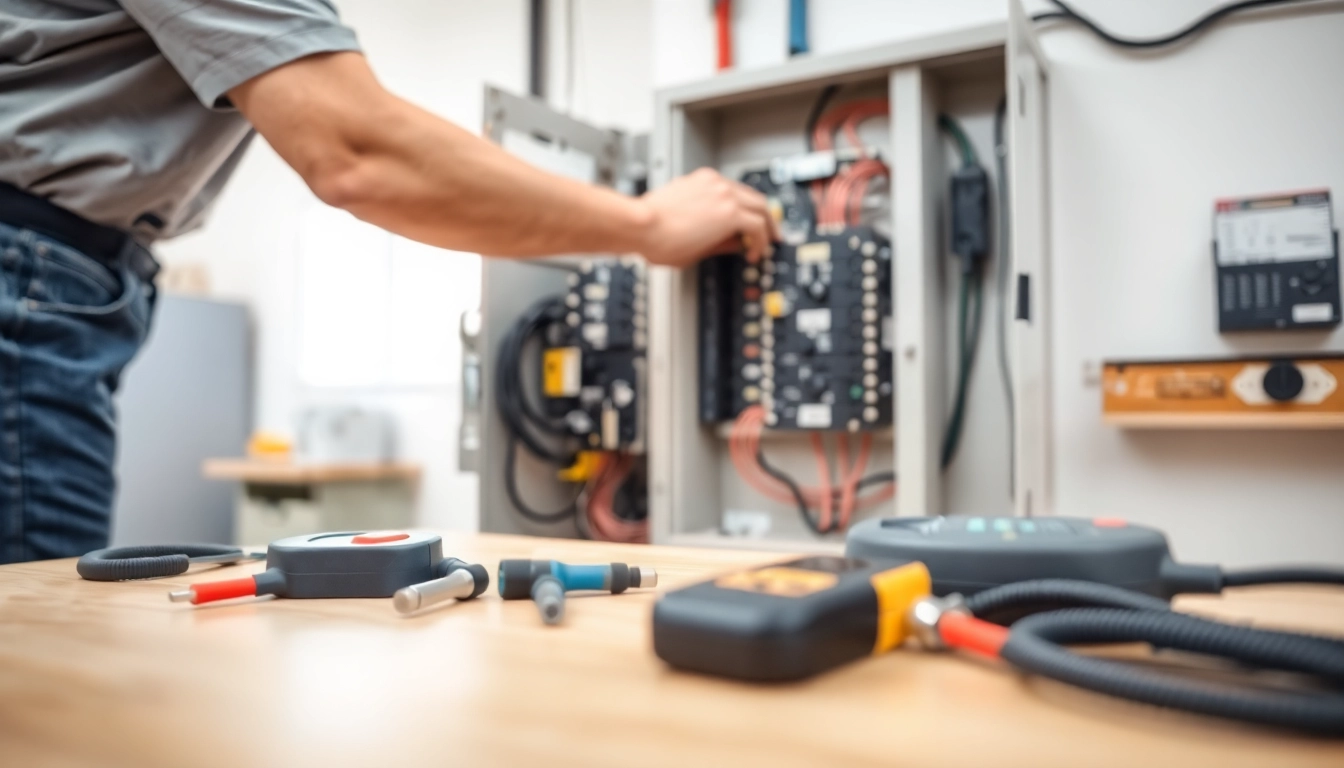Understanding Electrical Service: A Comprehensive Guide
Electrical service forms the backbone of our modern lifestyle, powering everything from essential appliances to sophisticated technology. It’s critical for homeowners and businesses alike to understand the nuances of electrical service to ensure safety and efficiency. This comprehensive guide will provide invaluable insights into electrical services, guiding you through everything from basic definitions to the intricacies of selecting a qualified electrician. You will also find practical tips on maintenance and cost considerations, ensuring that you approach your electrical needs with informed awareness. For more direct assistance, consider exploring our Electrical Service offerings.
What is Electrical Service?
At its core, electrical service refers to the provisioning of electrical power to a facility or home, facilitated through a network of wiring and infrastructure. This encompasses all aspects of electricity supply, including the installation, maintenance, and repair of electrical systems. An electrical service provider ensures that electrical systems are safely and effectively delivering power in line with local codes and regulations.
Electrical service involves varied functions, including the installation of wiring, circuit breakers, electrical panels, and outlets, as well as more sophisticated electrical needs like smart home setups and renewable energy solutions like solar power systems. Each component works in unison to ensure the reliable delivery of electricity, essential for our day-to-day operations.
Importance of Quality Electrical Service
The importance of high-quality electrical service cannot be overstated. Quality service can mean the difference between efficient energy management and hazardous situations, including electrical fires and system failures. Poorly installed or maintained electrical systems can lead to significant safety risks:
- Safety Hazards: Faulty wiring is a leading cause of residential fires. Quality electrical service minimizes risks by adhering to best practices and safety standards.
- Electrical Efficiency: Well-maintained systems consume energy efficiently, leading to lower utility bills. Quality installations maximize energy efficiency and reduce waste.
- Liability and Compliance: Ensuring that electrical systems meet local building codes protects homeowners and businesses from liability and potential fines.
Common Types of Electrical Services Offered
The scope of electrical services is broad and can include a variety of specialized functions. Understanding these categories can guide you in choosing the right service for your needs:
- Residential Electrical Services: This typically includes installation and maintenance of wiring, electrical panels, outlets, switches, and lighting fixtures within homes.
- Commercial Electrical Services: For businesses, services may involve more complex electrical systems, including security system installations, outdoor lighting, and energy management systems.
- Emergency Electrical Services: These urgent services are crucial during power outages, electrical surges, or failures that could pose immediate safety risks.
- Upgrades and Renovations: Services related to upgrading old systems, such as installing new circuit breakers or modern light fixtures, to enhance performance and aesthetic appeal.
When to Call for Electrical Services
Signs You Need Professional Electrical Help
Recognizing when to call in an expert is essential for maintaining the safety and functionality of your electrical systems. Consider the following signs:
- Frequent Circuit Breaker Trips: If your circuit breaker trips regularly, it could indicate an overloaded circuit or faulty wiring.
- Flickering Lights: Flickering or dimming lights can signal a serious problem, potentially related to a loose connection or faulty wiring.
- Burning Smell: A burning odor near outlets or wires is a major warning sign of overheating and potential electrical fires.
- Hot Outlets or Switches: If outlets or switches feel warm to the touch, it could indicate improper wiring or excessive load.
Emergency vs. Non-Emergency Electrical Services
Knowing the difference between emergency and non-emergency services can prioritize your response to electrical issues:
- Emergency Services: These situations require immediate attention, often involving power outages, exposed wires, or signs of a fire. Contact your service provider immediately in these cases.
- Non-Emergency Services: Routine maintenance or upgrades can be scheduled during regular business hours. This includes services like installation of fixtures or upgrades to circuits.
How to Prepare for an Electrician’s Visit
Preparation can enhance the efficiency of an electrician’s visit. Here are steps you can take:
- List Issues: Document any problems you’ve encountered, including details about when they occur.
- Clear Workspace: Make sure the area around electrical panels and outlets is free of obstructions.
- Discuss Expectations: Be ready to discuss what you hope to accomplish with the electrician, including specific concerns or desired upgrades.
Choosing the Right Electrical Service Provider
Key Factors to Consider in Selection
Choosing the right electrical service provider is critical for ensuring that your electrical needs are met safely and efficiently. Consider the following factors:
- Experience and Credentials: Look for licensed electricians with a good track record and the necessary qualifications.
- Insurance and Guarantees: A reputable provider should have liability insurance and offer guarantees on their work.
- Service Offerings: Ensure that they offer the specific services you need, whether residential, commercial, or emergency services.
Questions to Ask Your Electrician
Inquiring about your electrician’s methods and practices can reveal invaluable information. Consider asking:
- What licenses do you hold, and are you insured?
- Can you provide references or testimonials from past clients?
- What is your preferred method for handling unexpected issues during the job?
Reviewing Customer Testimonials and Ratings
Exploring customer testimonials is a valuable step in assessing the quality of service provided. Look for:
- Online Reviews: Check ratings on platforms such as Google, Yelp, or Angie’s List.
- Case Studies: Some electricians may provide examples of past projects, showcasing their expertise.
- Word of Mouth: Personal recommendations can be one of the most reliable sources of information.
Electrical Service Best Practices
Maintaining Home Electrical Systems
Regular maintenance of electrical systems is crucial for longevity and safety. Best practices for maintaining your home electrical systems include:
- Regular Inspections: Periodic checks by a licensed electrician can identify issues before they become serious.
- Testing Ground Fault Circuit Interrupters (GFCIs): Test these every month to ensure they are functioning properly.
- Replacing Old Outlets: Swap out worn or damaged outlets to prevent shorts and fires.
Safety Tips for DIY Electrical Work
For those considering some DIY electrical work, safety should always be a priority. Follow these guidelines:
- Turn Off Power: Always turn off the relevant circuit at the breaker box before beginning work.
- Use Proper Tools: Equip yourself with insulated tools while working on electrical components.
- Know Your Limits: Understand when to call a professional instead of tackling complex projects.
Regular Maintenance: Importance and Benefits
The benefits of regular maintenance can be profound, leading to both financial savings and enhanced safety. Essential benefits include:
- Increased Lifespan: Regular upkeep prolongs the life of electrical systems and appliances.
- Improved Safety: Maintenance can identify and eliminate potential hazards before they cause serious problems.
- Energy Efficiency: Keeping systems in peak condition ensures they operate efficiently, saving on electricity costs.
Cost Considerations in Electrical Services
Understanding Electrical Service Pricing
Electrical service costs can vary widely based on several factors, including the complexity of the job and your location. Generally, electrical work is charged based on:
- Hourly Rate: Many electricians charge an hourly rate, which can vary significantly based on experience and location.
- Flat Rates: Some services are charged at a flat rate, particularly common repairs and installations like installing light fixtures or outlets.
- Engineering Fees: For complex jobs requiring extensive planning or engineering, additional costs may come into play.
Budgeting for Electrical Repairs and Upgrades
When budgeting for electrical services, it’s essential to consider the following:
- Emergency Funds: Always set aside a portion of your budget for unexpected electrical issues.
- Prioritize Upgrades: Focus on essential upgrades first, like old panel replacements or inadequate wiring, before considering aesthetic enhancements.
- Get Multiple Quotes: Compare estimates from different electricians to ensure you get the best value for your investment.
Insurance Coverage for Electrical Work
Understanding your insurance policies regarding electrical services can provide peace of mind:
- Policy Review: Consult your insurance provider to understand what types of electrical services are covered.
- Liability Coverage: Ensure that your hired electrician has liability insurance to protect against accidents on your property.
- Homeowner’s Insurance: Some electrical repairs might be covered under your homeowner’s policy, reducing out-of-pocket expenses.



